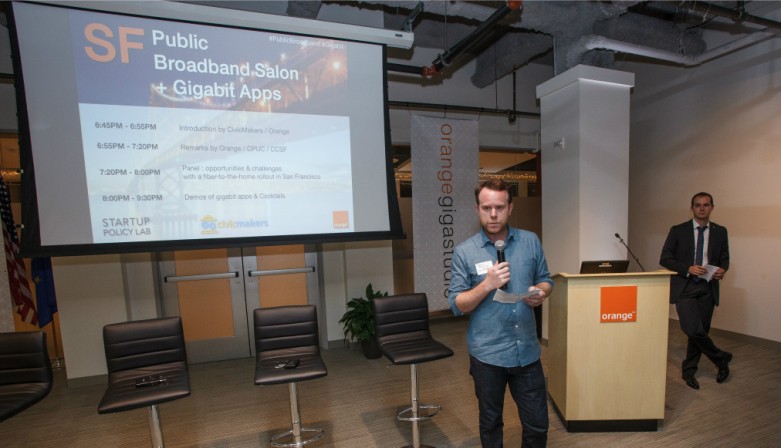
Toward Making Public Broadband a Reality in San Francisco
This post originally appeared on CivicMakers.org.
Earlier this month civic-tech enthusiasts, government representatives and telecommunications-industry professionals gathered to discuss what the future of public broadband in San Francisco looks like. This was the third event CivicMakers has hosted on the issue, and momentum is building, as evidenced from a standing-room-only crowd at the event.
A decade after the city’s first initiative to bring free city-wide Wi-Fi to its residents, the lack of public broadband is again a hot topic and there is growing consensus that we need to find a solution. As we learned, there is no question about the necessity of making the Internet accessible to all; however, finding the right approach is a bit more complicated. The question is as much about technology as it is about people, access and fairness.
Our emcee and CivicMakers co-founder, Brian Purchia, set the tone for the evening: “We are going to solve this problem. It will happen. What is it going to take? And who is responsible for making this so? That’s what [this] event is about.”
The chairman and CEO of Orange, Stéphane Richard, started the discussion by sharing some examples from France. He pointed out that while Europeans are constantly learning from the Silicon Valley, there are a few things that work well in Europe that San Francisco could learn from. One such example is offering fiber-optic cable at a price that makes it truly accessible to all.
There was general agreement about the importance of fast Internet not only for a more connected city, but for deeper economic implications. Today over 100,000 people in San Francisco don’t have any Internet access while 50,000 are using dial-up. In today’s connected world, a digital divide like that equals economic disadvantage.
California Public Utilities Commissioner Catherine Sandoval noted that the availability of broadband-speed Internet will become a crucial part of urban competitiveness of cities, just like rent. She highlighted the need to learn more about people who do not have access so the government can best help them. As California brings the Internet to underserved and unserved areas, classifying certain urban areas as such might be a part of the solution.
San Francisco Supervisor Mark Farrell emphasized that Internet access is a necessity, not a privilege, and as such a basic economic right. There is a very real digital divide that exists in San Francisco that the city is trying to solve. The report that is due to come out soon will address potential solutions to the problem and it is important to act on it soon as possible since the need for [public Internet access] won’t go away. New proposed legislation includes solutions such as mandating that construction projects lay public conduit lines for future access when they lay down fiber.
Jay Nath, the chief innovation officer of San Francisco, reviewed some public-broadband benefits and challenges. On the one hand there are things like universal access, bridging the digital divide, and the economic and educational opportunities associated with [this], which are all positive. On the other hand the city needs to take into consideration some challenges, most notably the scale of public investment, the fact that while [public broadband] has been done in many small cities few bigger ones have implemented it, and predatory incumbent practices.
During the panel discussion we heard many interesting perspectives on different issues related to making universally accessible public broadband a reality. Three key takeaways from the panel were that the public-broadband access is a political issue, that access is critical on multiple issues, and that there is big infrastructure involved that will have impacts on both privacy as well as the role of government in communications.
This is a problem that is going to be solved. There is a growing chorus of CivicMakers that want to help make it so, including our co-sponsors for the event, Startup Policy Lab, Mozilla, Free Press, the Greenlining Institute, Demand Progress, Media Alliance, Engine, EFF, the Internet Archive, Zero Divide and the Community Technology Network.